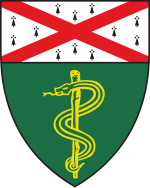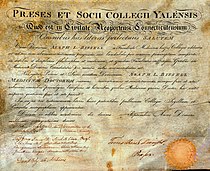Yale School of Medicine
 | |
| Type | Private medical school |
|---|---|
| Established | 1810 |
Parent institution | Yale University |
| Dean | Nancy J. Brown |
Academic staff | 5,166[1] |
| Students | 1,977[1] |
| Location | , , United States |
| Website | medicine |
The Yale School of Medicine is the graduate medical school at Yale University, a private research university in New Haven, Connecticut. It was founded in 1810 as the Medical Institution of Yale College and formally opened in 1813.[2]
The primary teaching hospital for the school is Yale New Haven Hospital. The school is home to the Harvey Cushing/John Hay Whitney Medical Library, one of the largest modern medical libraries which is known for its historical collections. The faculty includes 70 National Academy of Sciences members, 47 National Academy of Medicine members, and 13 Howard Hughes Medical Institute investigators.[1]
For the class of 2022, the school received 4,968 applications to fill 104 seats. The median GPA for the class was 3.89, and the median MCAT was 521.[3]
Education

The School of Medicine offers the Doctor of Medicine (MD) degree and a Master of Medical Science (MMSc) degree through the Yale Physician Associate Program and Yale Physician Assistant Online Program for prospective physician assistants. Public health degrees are administered through the Yale School of Public Health.[4]
There are also joint degree programs with other disciplines at Yale, including the MD/Juris Doctor (J.D.) in conjunction with Yale Law School; the MD/Master of Business Administration (MBA) in conjunction with the Yale School of Management; the MD/Master of Public Health (MPH) in conjunction with the Yale School of Public Health; science or engineering in conjunction with the Yale Graduate School of Arts and Sciences (MD/PhD); and the MD/Master of Divinity (MDiv) in conjunction with Yale Divinity School. Students pursuing a tuition-free fifth year of research are eligible for the Master of Health Science degree.
The school employs the "Yale System" established by Dean Winternitz in the 1920s, wherein first- and second-year students are not graded or ranked among their classmates. In addition, course examinations are anonymous and are intended only for students' self-evaluation. Student performance is thus based on seminar participation, qualifying examinations (if a student fails, it is his or her responsibility to meet with a professor and arrange for an alternative assessment - passing grades are not released), clinical clerkship evaluations, and the United States Medical Licensing Examination (USMLE). Prior to graduation, students are required to submit a thesis based on original research.
History

In 18th century United States, credentials were not needed to practice medicine. Prior to the founding of the medical school, Yale graduates would train through an apprenticeship in order to become physicians. Yale President Ezra Stiles conceived the idea of training physicians at Yale and ultimately, his successor Timothy Dwight IV helped found the medical school. The school was chartered in 1810 and opened in New Haven in 1813. Nathan Smith (medicine and surgery) and Benjamin Silliman (pharmacology) were the first faculty members. Silliman was a professor of chemistry and taught at both Yale College and the Medical School. The other two founding faculty were Jonathan Knight, anatomy, physiology and surgery and Eli Ives, pediatrics.[5]
One of Yale's earliest medical graduates was Dr. Asaph Leavitt Bissell of Hanover, New Hampshire, who graduated in 1815, a member of the school's second graduating class. Following his graduation, Dr. Bissell moved to Suffield, Connecticut, a tobacco-farming community where his parents came from, and where he practiced as a country physician for the rest of his life.[5] The saddlebags that Dr. Bissell carried in his practice, packed with paper packets and glass bottles, are today in the school's Medical Historical Library.[6]

The original building (at Grove and Prospect) later became Sheffield Hall, part of the Sheffield Scientific School (razed in 1931). In 1860, the school moved to Medical Hall on York Street, near Chapel (this building was razed in 1957). In 1925, the school moved to its current campus, neighboring the hospital. This campus includes the Sterling Hall of Medicine, Boyer Center for Molecular Medicine (1991, designed by Cesar Pelli), Anlyan Center (2003, designed by Payette and Venturi Scott Brown) and the Amistad Building (2007, designed by Herbert Newman).
On March 28, 2022, a former administrator pled guilty to fraud and tax charges for the theft of over $40 million dollars of computer and electronic software. Jamie Petrone-Codrington illegally bought and sold hardware purchased for the School of Medicine, starting in 2013. According to the court records, Petrone-Codrington was turned in by an anonymous tip after being seen loading computer equipment into her private vehicle after ordering suspiciously high volumes of equipment.[7]
Deans
Before 1845, there was no dean. Nathan Smith, followed by Jonathan Knight, provided leadership in the early years.[5]
- Charles Hooker (1845–1863): Professor of Anatomy and Physiology
- Charles Augustus Lindsley (1863–1885): Professor of Materia Medica and Therapeutics, later the Professor of the Theory and Practice of Medicine
- Herbert Eugene Smith (1885–1910): physician and chemist
- George Blumer (1910–1920)
- Milton Winternitz (1920–1935): pathologist
- Stanhope Bayne-Jones (1935–1940): physician and bacteriologist
- Francis Gilman Blake (1940–1947)
- Cyril Norman Hugh Long (1947–1952): physician and biochemist
- Vernon W. Lippard (1952–1967)
- Frederick Carl Redlich (1967–1972): psychiatrist
- Lewis Thomas (1972–1973): physician and author
- Robert Berliner (1973–1984)
- Leon Rosenberg (1984–1991)
- Robert M. Donaldson (acting) (1991–1992)
- Gerard N. Burrow (1992–1997)
- David Aaron Kessler (1997–2003): pediatrician, lawyer and former commissioner of the Food and Drug Administration
- Dennis Spencer (acting) (2003–2004): neurosurgeon
- Robert Alpern (2004–2020): nephrologist
- Nancy J. Brown (2020–present)
Notable faculty
Current
- Gretchen Berland: physician and filmmaker
- Hilary Blumberg (2015–): Furth Professor of Psychiatric Neuroscience
- Arthur L. Horwich (1984–): Sterling Professor of Genetics and Pediatrics, uncovered the action of chaperonins in his study of protein folding
- Marcella Nunez-Smith: Co-chair of the Biden-Harris Transition COVID-19 Task Force
- Onyema Ogbuagu: associate professor, director of the Yale AIDS Program clinical trials unit
- James Rothman (2008–): Fergus F. Wallace Professor of Biomedical Sciences, Chairman of the Department of Cell Biology, winner of the 2013 Nobel Prize in Physiology or Medicine
- Lisa Sanders: The New York Times Diagnosis columnist, technical advisor for TV show House, M.D.
- Joan Steitz (1970–): Sterling Professor of Biophysics and Biochemistry
Past
- C. Lee Buxton (1953–1965): obstetrician, birth control advocate and appellant in Griswold v. Connecticut
- Harvey Cushing (1933–1937): neurosurgeon, pioneer of brain surgery, identified Cushing's syndrome
- Russell Henry Chittenden (1900–1922): physiological chemist, pioneer of digestion and nutrition
- James William Colbert Jr., (1950–1953): immunologist, Assistant Dean of Postgraduate Education, and father of comedian Stephen Colbert
- Marilyn Farquhar (1973–1990): cell biologist, first woman Sterling Professor at Yale
- Stephen Fleck (1912–2002): psychiatrist, coauthor of Schizophrenia and the Family
- John Farquhar Fulton (1929–1960): Sterling Professor of Physiology, neurophysiology of primates
- Patricia Goldman-Rakic (1979–2003): neurobiologist, pioneer of studies on the frontal lobe and the cellular basis of working memory
- Arnold Gesell (1911–1949): psychologist and pediatrician, developed the Yale Child Study Center
- Alfred Gilman Sr. (1935–1943, 1973–1984): pharmacologist, chemotherapy pioneer and co-author of The Pharmacological Basis of Therapeutics
- Harry S.N. Greene (1943–1969): professor of pathology
- Dorothy Horstmann: epidemiologist, virologist, pioneer in the study of polio and the first woman appointed as a professor at the school[8]
- Orvan Hess: developed the fetal heart monitor and early use of penicillin
- James D. Jamieson (1973–2018): cell biologist, established the function of the Golgi apparatus alongside George Palade
- Theodore Lidz (1951–1978): Sterling Professor of Psychiatry, researcher of schizophrenia
- Lafayette Mendel (1921–1935): biochemist, discoverer of Vitamin A, Vitamin B and essential amino acids
- Sherwin B. Nuland: winner of the National Book Award for How We Die: Reflections on Life's Final Chapter
- George Emil Palade (1973–1983): cell biologist, Sterling Professor of Cell Biology, 1974 Nobel Prize in Physiology and Medicine
- William Prusoff: discovered idoxuridine, the first antiviral agent approved by the U.S. Food and Drug Administration, and discovered the anti-HIV effect of stavudine (D4T)[9]
- Juan Rosai (1985–1991): professor of pathology and Director of the Department of Anatomic Pathology, author of surgical pathology textbook, discoverer of Rosai-Dorfman disease and desmoplastic small round cell tumor
- Richard Selzer (1960–1985): surgeon and author
- Albert J. Solnit (1952–1990): psychoanalyst, child rights advocate, and Sterling Professor
- Nathan Smith: founder of Dartmouth Medical School and the University of Vermont College of Medicine
- Thomas A. Steitz (1970–2018): Sterling Professor of Biophysics and Biochemistry, 2009 Nobel Prize in Chemistry, discovered the atomic structure of the ribosome
- Richard W. Tsien (1945–): physiologist, characterized calcium channel types
- Frans Wackers (1977–1981, 1984–): nuclear cardiologist
- Brian Kobilka (1977–1981): physiologist, recipient of the 2012 Nobel Prize in Chemistry
See also
References
- ^ a b c "Facts and Figures 2018-19" (PDF). Yale School of Medicine. Yale University. Archived from the original (PDF) on 2 March 2021. Retrieved 25 March 2020.
- ^ "About Yale School of Medicine". Yale School of Medicine. Yale University. Retrieved 25 March 2020.
- ^ "Facts and Figures 2018-2019" (PDF). Medicine.yale.edu. Retrieved 29 June 2019.[permanent dead link]
- ^ "Online Physician Assistant Programs | Yale School of Medicine". Retrieved 2018-08-01.
- ^ a b c "Home - Yale School of Medicine". Medicine.yale.edu. Retrieved 29 June 2019.
- ^ "Yale Medicine Magazine - Yale School of Medicine". Medicine.yale.edu. Retrieved 29 June 2019.
- ^ Qu, Hannah (2022-03-28). "Former School of Medicine administrator pleads guilty to stealing $40 million from the University". Yale Daily News. Retrieved 2022-04-01.[permanent dead link]
- ^ Altman, Lawrence (January 21, 2001), "Dr. Dorothy Horstmann, 89; Made Strides in Polio Research", The New York Times, p. 36
- ^ Curtis, John (Fall 1999 – Winter 2000), "A lifetime making mischief with DNA", Yale Medicine

